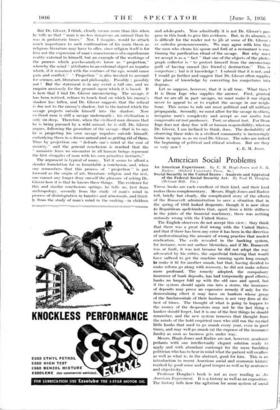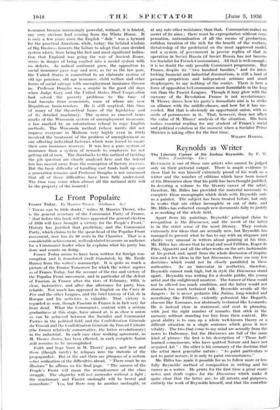American Social Problems
Social Security in the United States : Analysis and Appraisal of the Federal Social Security Act. By Paul H. Douglas. (McGraw-Hill. 15s.) THESE books are each excellent of their kind, and their kind makes them complementary. Messrs. Hugh-Jones and Radice tell, briefly but clearly, the complicated story of the efforts of the Roosevelt administration to save a situation that in the spring of 1933 looked desperate, though it is now clear to Republican spell-binders that, apart from a little stiffness
in the joints of the financial machinery, there was nothing seriously wrong with the United States.
The English observers do not accept this view ; they think that there was a great deal wrong with the United States, and that if there has been any error it has been in the direction of underestimating the amount of wrong practice that needed eradication. The evils revealed in the banking system, for instance, were not surface blemishes, and if Mr. Roosevelt was at fault, it was not because he did not adopt the way advocated by his critics, the superficial tinkering that would have sufficed to get the machine running again long enough
to make it fit for another smash, but that, having decided to make reform go along with recovery, he did not make reform
more profound. The remedy adopted, the compulsory
insurance of bank deposits, has had temporarily good effects; banks no longer fold up with the old ease and speed, but if the system should again run into a storm, the insurance of deposits may prove an expensive remedy if only for the
demoralising effect it may have on bankers whose grasp of the fundamentals of their business is not very .firm at the best of times. The thought of what is going to happen to the money of the despositors may not be the last thing a banker should forget, but it is one of the first things he should remember, and the new system removes that thought from the minds of the bold empirical men who still run the myriad little banks that used to go smash every year, even in good times, and may well go smash (at the expense of the insurance funds) as soon as business gets under way.
Messrs. Hugh-Jones and Radice are not, however, academic pedants with one intellectually elegant solution ready to apply and with abundant contempt for the mere fumbling politician who has to bear in mind what the patient will swallow as well as what is, in the abstract, good for him. This is an introduction to recent American social and economic history marked by good sense and good temper as well as by acuteness and objectivity.
Professor Douglas's book is not as easy reading as An American Experiment. It is a history as well as an exposition.
The history tells how the agitation for some system of social
insurance became increasingly powerful, without, it is hinted, any very obvious lead coming from the White House. It is only a few years since the English " dole " was a byword for the practical American, while, today; the belated wisdom of Big Business laments the failure to adopt that once derided system which, from being the first and most significant indica- tion that England was going the way of Ancient Rome, seems in danger of being exalted into a model system with no defects. As radical sentiment grew, the opposition to social insurance gave way and now, as far as the law goes, the United States is committed to an elaborate system of old age pensions, old age insurance, child welfare and other forms of social salvage with unemployment insurance thrown in. Professor Douglas was a sceptic in the good old days when Judge Gary and the United States Steel Corporation had solved the poverty problems to the tune of loud hurrahs from economists, some of whom are now Republican brain-trusters. He is still sceptical, this time of ninny of the theoretical bases of the legislation and of its detailed machinery. The system as enacted bears marks of the Wisconsin system of .unemployment insurance, a law marked by an ostentatious refusal to copy English methods. The Wisconsin method (whose merits did not impress everyone in Madison very highly even in 1934) involved the treatment of the problem of unemployment as one affecting individual factories which were forced to create their own insurance reserves. It was less a pure system of insurance than a system of rewards to employers for not getting rid of men. The drawbacks to this method of tackling the job question are clearly analysed here. and the federal law has moved away from the conception of factory reserves. But the basic difficulty of handling vast funds built up over a generation remains and Professor Douglas is not convinced that all of those difficulties have been fully understood. The time may come when almost all the national debt will be the property of the insured















































 Previous page
Previous page